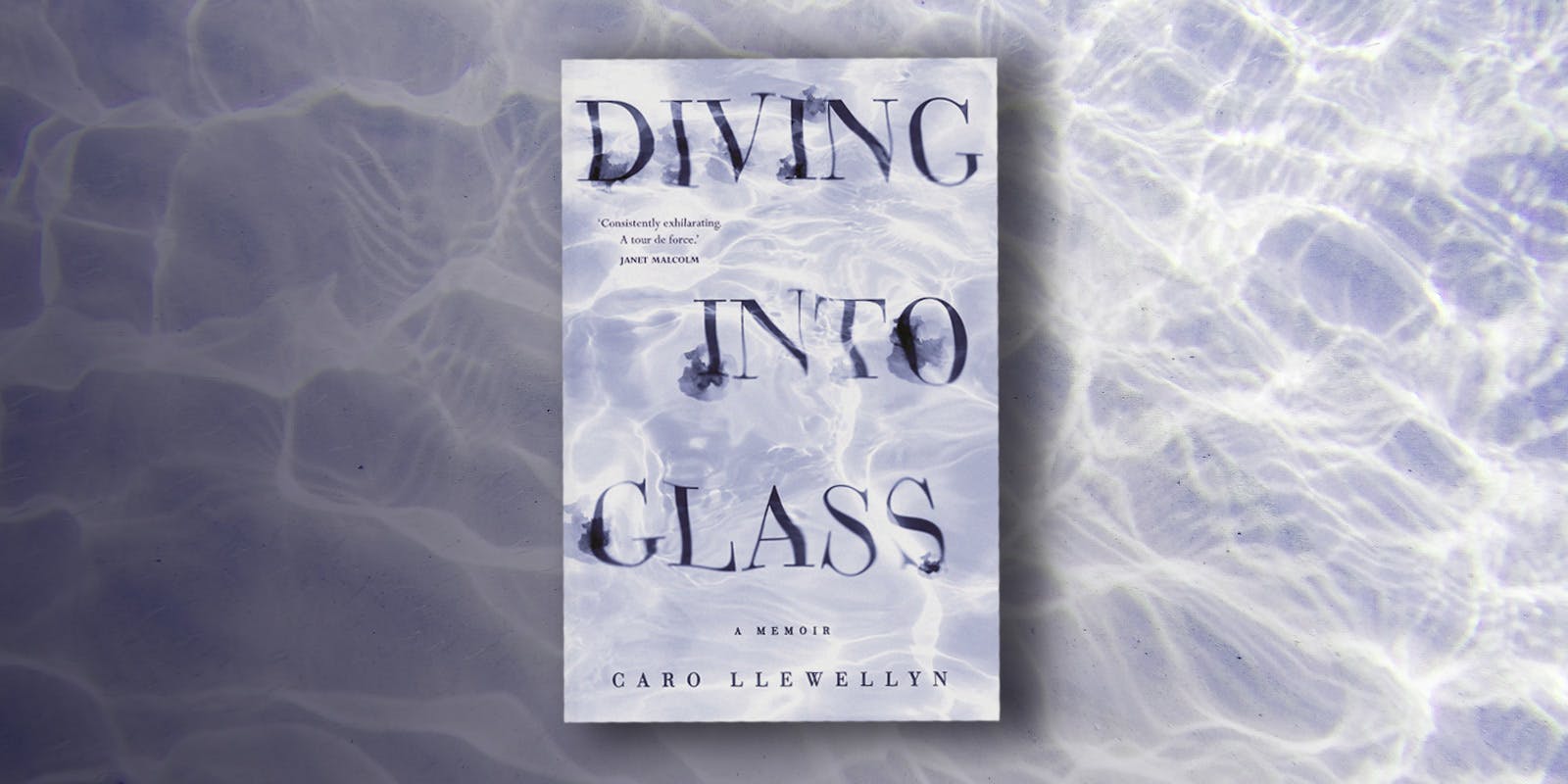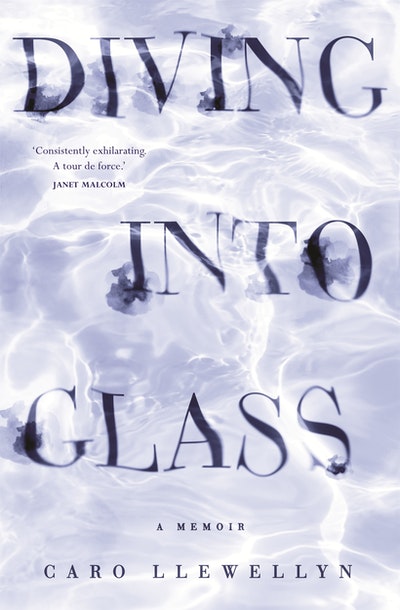Caro Llewellyn begins the task of reassembling the shards of a shattered life.
Two days after Caro Llewellyn lost all sensation in her legs while running in New York’s Central Park, she was diagnosed with multiple sclerosis. It was as life-changing a moment as any of us could ever experience. Blinded by fury and humiliation, she struggled to summon the grace and courage of her father, Richard, who built a successful life despite being confined to a wheelchair for most of it. So she began to look back on the resilience she’d witnessed while growing up, hoping to discover the grit required to begin to rebuild her life. Diving into Glass is her reflection on this process. In the passage below, she details the moment that everything changed.
I was a runner all my life. At school in Adelaide, I was in the long-distance team, running long and hard for miles, my eyes set to the ground, one foot in front of the other until my legs shook and felt like they’d buckle from under me. Usually runners choose long or short distance and stick to one or the other, but I ran track too. Hurdles, relay, 800, 400, 200, 100 metres. It didn’t matter what I ran, so long as I was spent when I crossed the finish line, bent over with my hands on my thighs, my chest heaving.
My life changed on a Sunday in 2009, a few weeks after my birthday. Heart-stopping, life-changing moments happen one ordinary instant after the other, until one instant is oddly not ordinary and then, sometimes, shockingly fast, the whole thing is irreversibly changed and you’re faced with the very opposite of ordinary.
Just like there had been forewarning of my father’s day of reckoning, there were signs for me too – but neither of us saw that day coming. Perhaps it’s for the better that, as things unfolded, it was just one tiny incremental change after another, almost unnoticeable. Until it wasn’t. Fifty years apart, we were both blindsided.
One ordinary instant after another until your life is no longer ordinary and your world lies in tiny shards at your feet and your next thought determines how well – or how badly – you will be able to piece those shards back together again.
Twenty minutes earlier, I’d been sitting on my bed in my Harlem apartment, bent over, chest on my thighs, tying the laces of my running shoes. Then I was down the stairs, out onto the stoop, where I stretched my calves against the tall steps. I walked to the corner of my street, took a left at Adam Clayton Powell Jr Boulevard and headed towards the park.
Even though I’d stretched, as I started up the hill at the northern end of the running track, I felt as though two ten-pound weights were strapped to my ankles.
Butter-yellow light flickered through the trees, which had just begun their slow burn into rusted fall colours. I loved the way the seasons in New York turned from one day to the next. There could be thick snow on the ground and the following day – or so it seemed – daffodils would magically push through the earth to announce spring.
At the top of the north-western hill I found myself increasingly unsure if my feet would land where they were meant to. I pressed on, steeling myself against the fear creeping over me, hoping the sensation would pass. After about a quarter of a mile, I couldn’t feel my legs moving at all. It was as if I was disconnected from the ground, moving on two prosthetic limbs. Eventually I stopped, bent over and put my hands on my thighs like I’d done after crossing hundreds of finish lines in my life.
But I wasn’t across any line. Certainly, I had run no marathon. I’d hardly begun, but my chest was heaving. When I straightened up, I held my palms open to the sky like a person receiving communion. They were completely wet.
I couldn’t feel the wetness on my legs, only on my hands. It took me a moment to realise what had happened, but as soon as the confusion cleared, I walked into the bushes, gasping for air in panic and shame, tears streaming down my face, tramping through the foliage, deranged, looking at my hands like Lady Macbeth, wondering how on earth this had happened.
There are parts of Central Park – particularly at the northern end – where the foliage and trees are almost as thick as a wilderness. If someone blindfolded you and dropped you down in the middle of that thicket, once you navigated your way out you’d be amazed to find busy city streets only a few hundred metres away.
I pushed my way through scraggy bushes until I came across a huge tree felled by a recent storm and sat down on it. My track pants clung to my thighs and, when I stood up some minutes later, there was a large darkened wet patch where I’d been sitting. I hadn’t just peed my pants a little bit.
I always listened to the same soundtrack when I ran and my iPod was strapped to my arm, ear pods in my ears. My flip-phone was in my pocket, but I was too embarrassed and too upset to call anyone. I wasn’t even sure I’d be able to make myself understood through my heaving and tears. What would I say, anyway? None of it made any sense.
Eventually I pulled myself together enough to tie my sweatshirt around my waist to hide the wet patch between my legs and made my way out of the park. The great thing about New York City is that there’s too much going on and too many people for anyone to notice much. Even so, I walked as fast as I could up Malcolm X Boulevard, my eyes down to the footpath, hoping I wouldn’t see anyone I knew.
I undressed as soon as I got home, threw my clothes in the washer, put the plug in the bath, turned on the shower and sat in the tub clutching my knees to my chest while water, as hot as I could stand it, pummelled my shoulders. The dark cloud of realisation that there was no turning back from this moment bore down on me.
When the bathtub was filled with water up to my chest, I turned off the shower, put my head under the water and screamed as loud as I could.
Eventually my breathing returned to a steady rhythm, but I was still bewildered. Not only could I not understand what was happening, I was devastated by the idea that such a thing – whatever it was – could be happening to me.
I wasn’t Athena, the ancient goddess of victory and wisdom, I was a snivelling Job, sitting in a bathtub demanding, ‘Why me?’
I’d done everything I had been taught as dutifully as I knew how. I’d made a mantra of putting aside fear. The more frightening the task, the more strongly I believed it needed to be done. I rarely complained. I had leapt so many times, and the net had appeared so many times, that I relied on it without question. I had courted neither security nor stability, had made few demands on others, had kept myself free, and yet an hour earlier I had been looking down at my piss-soaked, numb legs, barely able to breathe.
What happened to my father’s promise? Sitting in the tub in my apartment, I realised he had not protected me from anything. How could he? Promises like that can’t be made. Even from the most well-meaning and protective parent. There are no superheroes waiting in the wings. We’re on our own in life and fate will always deal exactly the cards it wishes, no matter the will or love of any human being. And yet I had believed my father, thinking the risks I took would never have consequences, the shaky, thin limbs I climbed out on without caution would never snap. But all my self-reliance and adaptability had failed me.
‘Why me?’ If I was ever going to get past that question I had to stop running. I had to work out how to take back control of the rudder that had been so dramatically snatched from my hand. It was time to look back.













